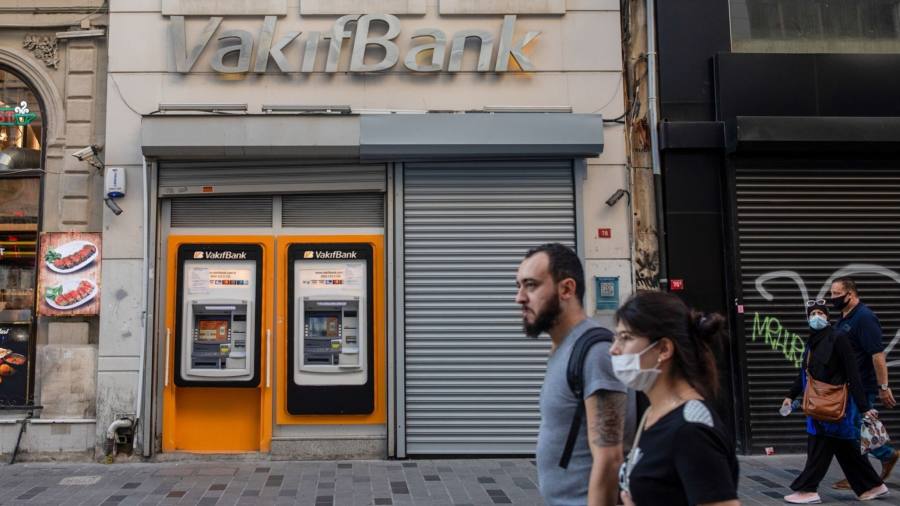
Receive free Turkish economy updates
We’ll send you a myFT Daily Digest email rounding up the latest Turkish economy news every morning.
Foreign investors are wading into Turkish stocks and bonds as Ankara’s economic policy overhaul piques the interest of fund managers who have deserted the country in recent years.
A trio of deals this week mark the latest sign of how some foreign investors are willing to test the waters after Turkish president Recep Tayyip Erdoğan abruptly changed course on economic policy after winning May’s general election.
Turkish lenders VakıfBank and Yapı Kredi successfully sold $1.3bn collectively in dollar-denominated bonds, while baby goods retailer Ebebek attracted two dozen foreign institutional investors for its $70mn initial public offering.
“Recent months have seen a noticeable and positive change in international investor interest in Turkish capital markets,” said Selim Kervancı, chief executive of HSBC Turkey. “The interest is broad based with demand coming from the UK, Europe, US and the Middle East refocusing on Turkey as an investment destination.”
Ebebek pulled in far more institutional foreign money managers than any other IPO on Istanbul’s stock bourse so far this year, with the median 2023 deal drawing just two international institutional investors, according to Financial Times calculations based on corporate disclosures. Many of this year’s deals have relied heavily on Turkish retail investors, who have leapt into the market in search of shelter from an acute inflation crisis.
US-based Franklin Templeton and emerging markets specialist East Capital each scooped up just above 5 per cent of the Ebebek shares on offer, according to regulatory filings. It is the first time this year a mainstream foreign fund manager has purchased such a significant portion of a Turkish IPO.
Overseas investors have poured about $1.4bn into Turkey’s equities market since the beginning of June, but allocations to the country’s stocks and bonds remain near historic lows after Erdoğan’s unorthodox policies destabilised Turkey’s $900bn economy and set off an inflation crisis.
“High-quality institutional foreign investors are now starting to show much more interest in the Turkish economy with the decisions that are being taken,” said Tunç Yıldırım, head of institutional equity sales at ÜNLÜ & Co, which led the Ebebek IPO.
Yıldırım said that interest among foreign investors had “accelerated” after Turkey’s central bank last month boosted interest rates by 7.5 percentage points, far more than markets had anticipated, as it stepped up its battle against inflation. The rise was seen by many investors as an indication that central bank chief Hafize Gaye Erkan, who was appointed in June, is serious in her pledge to restore price stability by reversing the low-rate policies put in place at Erdoğan’s direction.
Jacob Grapengiesser, chief investment officer at East Capital, described the big rate rise as a “game changer”. He said the asset manager “had been quite lightly positioned in Turkey but we have been increasing positions gradually [since the election]”.
Hopes that Turkey will stick with its new economic plan were bolstered further on Wednesday when Erdoğan, a life-long opponent of high borrowing costs, pledged to use “tight monetary policy” to battle inflation, which is forecast by the government to reach 65 per cent by year-end.
The VakıfBank and Yapı Kredi deals also highlight how companies are beginning to contemplate tapping international bond markets, which had been seen by many executives and bankers as largely closed to Turkish entities as economic concerns swirled earlier this year.
State bank VakıfBank garnered $2.2bn in orders for its $750mn five-year sustainable dollar bond deal, according to a term sheet seen by the FT. The deal, which Dealogic data shows was the first major international bond issuance by a Turkish entity since April, priced at a yield of just over 9 per cent. Another VakıfBank dollar bond maturing in 2026 had traded with a yield of 12 per cent in May at a time of severe tumult in Turkey’s markets.
In a further sign that debt capital markets activity is hotting up, Yapı Kredi, another big Turkish lender, sold a $500mn five-year sustainable dollar bond at a yield of 9.4 per cent, attracting $1bn in orders for the deal. A senior capital markets banker at a major western bank said other Turkish companies were also beginning to line up debt deals.
Kervancı at HSBC said that one trend that could benefit the Turkish capital market going forward was that a wider group of investors was now contemplating Turkish financial assets, adding: “Investors [are] looking to invest across a broader range of listed Turkish clients beyond the main blue-chip names and exporters.”